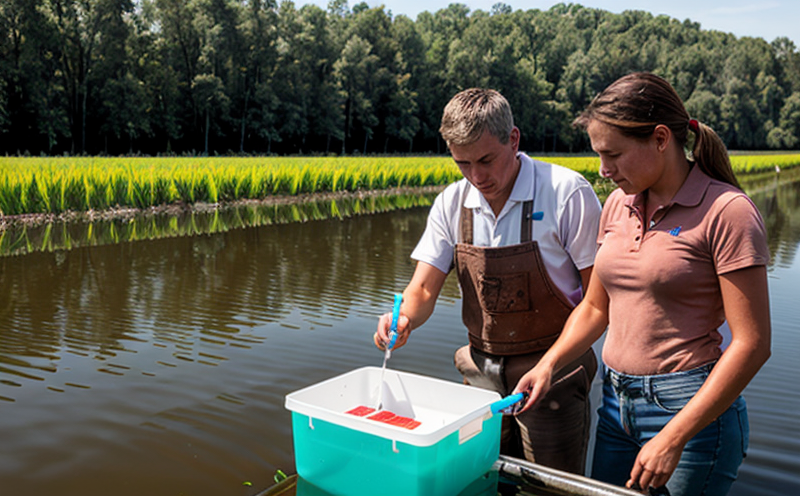Total Coliform Testing in Agricultural Water
Water quality is a critical factor in agricultural practices. The presence of total coliforms in water supplies can indicate contamination and potential health risks, especially for crops like fruits, vegetables, and leafy greens that are consumed raw. Total coliform testing plays an essential role in ensuring the safety and quality of irrigation water used by farmers.
Coliform bacteria are a group of Gram-negative, rod-shaped bacteria commonly found in soil, water, and food. They include both pathogenic and non-pathogenic species. While not inherently harmful themselves, their presence can indicate fecal contamination from animal or human waste. This contamination could lead to the introduction of pathogens into the agricultural environment.
The ISO 11148-3:2009 standard specifies the procedure for testing water samples for total coliforms. This method involves incubating samples at specific temperatures to observe any growth of coliform bacteria, which can then be quantified and reported.
Total coliform testing is critical in agriculture because it helps farmers monitor their water sources and ensure that they meet regulatory standards set by authorities such as the European Union's Drinking Water Directive. Compliance with these regulations not only protects public health but also ensures that agricultural products remain marketable and safe for consumption.
Proper specimen preparation involves collecting representative samples from various points in the irrigation system, ensuring that no cross-contamination occurs during collection or processing. The specimens are then transported to the laboratory under controlled conditions to prevent any growth of bacteria before testing.
The testing process typically includes several steps: pre-enrichment, where the sample is incubated at 36°C for 24 hours; followed by a secondary enrichment step at 44.5°C for another 24 hours if coliforms are suspected. The final step involves inoculating EMB (Eosin Methylene Blue) agar plates and incubating them overnight to observe the formation of colonies. Positive results will show characteristic purple-black, blue, or green colonies.
The acceptance criteria for total coliform testing in agriculture include meeting the thresholds set by local regulatory bodies like the World Health Organization or European Commission. For instance, a standard might stipulate that no more than 12 MPN (Most Probable Number) per liter should be present in irrigation water used for food crops.
Understanding and adhering to these testing protocols is crucial for quality managers and compliance officers who are responsible for ensuring that agricultural practices meet both internal standards and external regulatory requirements. By incorporating total coliform testing into their routine, farmers can enhance the safety of their produce and maintain a good reputation in the market.
Eurolab Advantages
At Eurolab, we pride ourselves on providing high-quality, reliable services that meet the stringent requirements set by international standards. Our expertise lies in delivering accurate results through comprehensive testing and analysis of water samples from various agricultural settings.
- Compliance with International Standards: We adhere to ISO 11148-3:2009, ensuring that our methods are consistent with global best practices.
- Experienced Staff: Our team of laboratory professionals is highly skilled and trained in total coliform testing techniques. They bring years of experience to every project, ensuring accurate results.
- State-of-the-Art Equipment: Equipped with the latest technology and instrumentation, our lab can handle complex analyses efficiently and effectively.
- Rapid Turnaround Times: We understand the importance of timely reports in agricultural operations. Our streamlined processes allow us to deliver results quickly without compromising accuracy or reliability.
- Confidentiality: All data remains strictly confidential, ensuring that our clients can trust us with their sensitive information.
Our commitment to excellence is reflected in every service we provide. Whether you need routine testing or one-off assessments, Eurolab ensures that your water quality meets the highest standards and regulatory requirements.
Why Choose This Test
- Identify Contamination: Total coliform testing helps in identifying sources of contamination early, allowing for prompt corrective actions.
- Ensure Compliance: By adhering to international standards like ISO 11148-3:2009, you ensure that your agricultural operations meet regulatory requirements.
- Risk Management: Knowing the presence of coliforms allows for risk management strategies to be put in place, protecting both human health and crop quality.
- Increase Productivity: By maintaining water quality standards, you can reduce downtime due to contaminated water issues, thereby increasing overall productivity.
Total coliform testing is a crucial step in the agricultural supply chain. It ensures that farmers are aware of any potential risks and can take necessary precautions to prevent contamination from reaching the final product. This proactive approach not only enhances food safety but also builds consumer trust, leading to higher market acceptance and better business outcomes.





